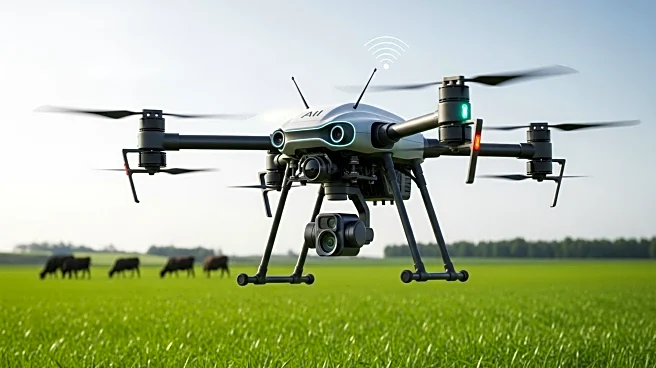What is the story about?
What's Happening?
Scientists at the University of Arkansas are leveraging artificial intelligence (AI) to advance agricultural research, focusing on genetic variation and disease outcomes in livestock. AI models are being used to create biological 'clocks' that estimate gut maturity, providing insights into animal health and productivity. Rich Adams, an assistant professor of agricultural statistics, is integrating statistical learning and comparative biology to study genome structure and function changes over time. His research aims to better understand plant and insect interactions, developing methods to predict evolutionary associations among traits. The team is also using machine learning to study protein diversity among plants, fungi, insects, and microbes, exploring the broader consequences of these interactions.
Why It's Important?
The application of AI in agricultural research holds significant potential for improving animal health and productivity, which is crucial for the agricultural industry. By understanding genetic variations and disease outcomes, scientists can develop more effective strategies for livestock management. The research on genome structure and function changes can lead to better crop protection and pest management, enhancing food security. The insights gained from studying protein diversity can inform sustainable agricultural practices, benefiting both the environment and the economy. These advancements could lead to increased efficiency and reduced costs in agriculture, impacting farmers and consumers alike.
What's Next?
Future research will likely focus on refining AI models to ensure they are efficient and effective in solving complex biological problems. Scientists will continue to explore the interactions between different organisms, aiming to develop sustainable agricultural practices. The integration of AI and machine learning in agriculture may lead to new technologies and methods for improving crop yields and livestock health. Stakeholders in the agricultural industry, including farmers and policymakers, will need to adapt to these technological advancements to remain competitive and sustainable.
Beyond the Headlines
The use of AI in agriculture raises ethical considerations regarding data privacy and the potential for technology to replace human labor. There is also a need for responsible interpretation of AI-generated insights to avoid misapplication. Long-term, AI could transform traditional farming practices, leading to shifts in labor markets and rural economies. The cultural acceptance of AI-driven methods in agriculture will be crucial for widespread adoption.

















